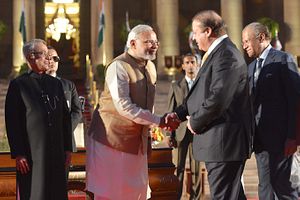Dialogue triumped and there can be no substitute for dialogue. This is the only take away from the meeting between Indian Prime Minister Narendra Modi and his Pakistani counterpart, Nawaz Sharif. The momentum generated in May 2014, when last the two leaders shook hands, has lost its steam. Jingoism and hyper-nationalism have spoiled the atmosphere, and any budding camaraderie between the two leaders has been nipped in the bud.
However, the developments stemming from their meeting in the Russian town of Ufa this week promise a new beginning in the relationship, assuring new engagements between both the civil and military officials of the two nations in order to tackle cross-border incursions and terrorism.
Modi has also accepted Sharif’s invitation to attend next year’s summit of South Asian Association of Regional Cooperation (SAARC). If that happens then the Hindu right-wing leader would be the first Indian premier in over a decade to step foot in Pakistan.
But can we trust these new initiatives?
New Delhi, in a huff, cancelled foreign secretary-level talks last year after Pakistan’s ambassador met with Kashmiri separatist leaders. The government wanted to send a tough message to Islamabad that it cannot tolerate interference in its internal affairs. The decision unleashed unprecedented jingoism in India, with hardliners stressing that Islamabad must comply in punishing the masterminds of the Mumbai terror attack.
In June, the Indian military launched an offensive against insurgents along the border with Myanmar. Some ministers warned that a similar offensive could be launched against the Pakistan border–such comments were not well-received in Islamabad.
With this in mind is Ufa really a “breakthrough”? What changed so suddenly that New Delhi decided to forgo stridency in favor of engagement?
One cannot discount the possibility of pressure on New Delhi from Russia and the United States to resume the bilateral talks with Pakistan. The changing dynamics between Moscow and Islamabad cannot be ignored by India. For a smooth functioning of the Shanghai Cooperation Organization (SCO), a good relationship between India and Pakistan, which are set to become full members next year, is important. It was, therefore, untenable for New Delhi to continue with its strident policy towards Pakistan.
Furthermore, with Pakistan and Afghanistan forming an entente and collaborating in bringing Taliban on negotiating table, New Delhi feels left out in the emerging geopolitical reality.
However, for a successful dialogue with Pakistan it is very important to create a domestic consensus. There is no political understanding between two major political parties–Congress and the BJP–as to how to go about dealing with Islamabad. The Hindu right-wing, before coming into power, was vehemently opposed to any kind of normalization of relations with Pakistan as long as the masterminds of the November 2008 Mumbai terror attacks remained unpunished and and Pakistan continues to support cross-border terrorism. The Congress Party, now the opposition, has adopted the same belligerent stand.
How will the BJP explain to its own hardcore supporters the need for good neighborly relations? Anti-Pakistan sentiment is so strong among the core voters of the ruling party that it will be difficult for the government to engage in out-of-the-box initiatives with Pakistan.
Will Pakistanis and their leadership be as enthusiastic about Modi’s initiatives as they were a year ago when the Indian prime minister went out of way to invite Sharif to India for his inauguration?
Some political analysts see the latest developments in Ufa as an attempt to divert people’s attention in the country from the raging debate on corruption, which has put the Modi regime on the defensive.
Indo-Pakistan relations have passed through so many flip-flops in the last seven decades that any new dialogue process invites cynicism.
Modi ignited new hope when he assumed office and started the process of engagement with Pakistan. However, he could not bring about any paradigm shift in relationship with Islamabad so far. Only time will tell whether this new initiative is the beginning of new thinking on the part of New Delhi. But the history of the India-Pakistan relationship does not inspire much confidence.
































